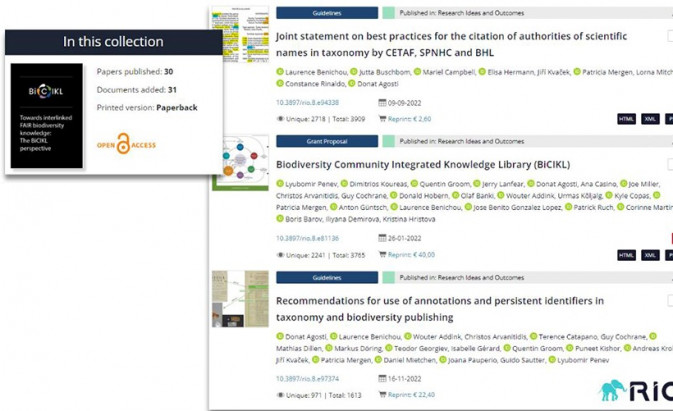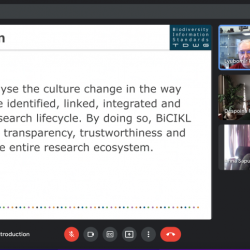The dynamic open-science project collection of BiCIKL, titled “Towards interlinked FAIR biodiversity knowledge: The BiCIKL perspective” (doi: 10.3897/rio.coll.105), continues to grow, as the project progresses into its third year and its results accumulate ever so exponentially.
Following the publication of three important BiCIKL deliverables: the project’s Data Management Plan, its Visual identity package and a report, describing the newly built workflow and tools for data extraction, conversion and indexing and the user applications from OpenBiodiv, there are currently 30 research outcomes in the BiCIKL collection that have been shared publicly to the world, rather than merely submitted to the European Commission.
Shortly after the BiCIKL project started in 2021, a project-branded collection was launched in the open-science scholarly journal Research Ideas and Outcomes (RIO). There, the partners have been publishing - and thus preserving - conclusive research papers, as well as early and interim scientific outputs.
The publications so far also include the BiCIKL grant proposal, which earned the support of the European Commission in 2021; conference abstracts, submitted by the partners to two consecutive TDWG conferences; a project report that summarises recommendations on interoperability among infrastructures, as concluded from a hackathon organised by BiCIKL; and two Guidelines papers, aiming to trigger a culture change in the way data is shared, used and reused in the biodiversity field.
In fact, one of the Guidelines papers, where representatives of the Consortium of European Taxonomic Facilities (CETAF), the Society for the Preservation of Natural History Collections (SPNHC) and the Biodiversity Heritage Library (BHL) came together to publish their joint statement on best practices for the citation of authorities of scientific names, has so far generated about 4,000 views by nearly 3,000 unique readers.
At the time of writing, the top three of the most read papers in the BiCIKL collection is completed by the grant proposal and the second Guidelines paper, where the partners - based on their extensive and versatile experience - present recommendations about the use of annotations and persistent identifiers in taxonomy and biodiversity publishing.
Caption: Access to data and services along the entire data and research life cycle in biodiversity science. The figure was featured in the BiCIKL grant proposal, now made available from the BiCIKL project collection in RIO Journal. Credit: BiCIKL.
What one might find quite odd when browsing the BiCIKL collection is that each publication is marked with its own publication source, even though all contributions are clearly already accessible from RIO Journal.
So, we can see many project outputs marked as RIO publications, but also others that have been published in the likes of F1000Research, the official journal of TDWG: Biodiversity Information Science and Standards, and even preprints servers, such as BiohackrXiv and ARPHA Preprints.
This is because one of the unique features of RIO allows for consortia to use their project collection as a one-stop access point for all scientific results, regardless of their publication venue, by means of linking to the original source via metadata. Additionally, projects may also upload their documents in their original format and layout, thanks to the integration between RIO and ARPHA Preprints. This is in fact how BiCIKL chose to share their latest deliverables using the very same files they submitted to the Commission.
“In line with the mission of BiCIKL and our consortium’s dedication to FAIRness in science, we wanted to keep our project’s progress and results fully transparent and easily accessible and reusable to anyone, anywhere,”
explains Prof Lyubomir Penev, BiCIKL's Project Coordinator and founder and CEO of Pensoft.
“This is why we opted to collate the outcomes of BiCIKL in one place - starting from the grant proposal itself, and then progressively adding workshop reports, recommendations, research papers and what not. By the time BiCIKL is concluded, we will not only be ready to refer back to any step along the way that we have just walked together, but also rest assured that what we have achieved and learnt remains at the fingertips of those we have done it for and those who come after them,” he adds.
***
You can keep tabs on the BiCIKL project collection in RIO Journal by subscribing to the journal newsletter or following @RIOJournal on Twitter and Facebook.BiCIKL continues to update project outcomes in own collection in RIO JournalBiCIKL continues to update project outcomes in own collection in RIO Jou


